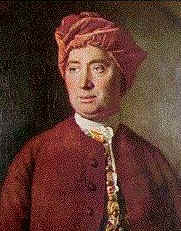Happy Birthday, David Hume

Edinburgh, Scotland. Around the turn of the 18th century it was one of the poorest and most backward cities in Western Europe. Alcoholism was rampant even though (or maybe because?) the religious climate was extremely strict. If anyone didn't attend church on the Sabbath, there was a volunteer group of religious police known as the Seizers who would grab them on the street and forcibly take them to mass - a chilling thought, no?
In 1697, 18-year-old college student Thomas Aikenhead was put on trial for saying openly among his friends that he thought Christianity was "ill-invented nonsense." He was convicted and hanged for blasphemy. In 1755, the General Assembly of the Church of Scotland tried to prosecute and excommunicate Hume for his skepticism about religion. It was only sixty years after Aikenhead was hanged to death for similar charges, but the case against Hume was dismissed - his clerical friends argued that as an atheist, he was not under the church's jurisdiction.
In the slightly less than sixty years between the two trials, the Enlightenment had happened. And David Hume was one of its leaders.
Hume was a skeptic, and an atheist, and among his many theories he often dealt with religion. The problem of miracles, for instance, in which he argued that a miracle is a violation of the laws of nature by God, and that it's impossible to violate the laws of nature. He claimed that human testimony could never be reliable enough to countermand the evidence we have for the laws of nature. At the very least, he said, we require strong supporting evidence to defeat our initial presumptions. In more familar form: extraordinary claims require extraordinary evidence.
He also took on Intelligent Design:
One of the oldest and most popular arguments for the existence of God is the design argument – that all the order and 'purpose' in the world bespeaks a divine origin. Hume gave the classic criticism of the design argument in Dialogues Concerning Natural Religion and An Enquiry Concerning Human Understanding and though the issue is far from dead, many are convinced that Hume killed the argument for good. Here are some of his points:
- For the design argument to be feasible, it must be true that order and purpose are observed only when they result from design. But order is observed regularly, resulting from presumably mindless processes like snowflake or crystal generation. Design accounts for only a tiny part of our experience with order and 'purpose'.
- Furthermore, the design argument is based on an incomplete analogy: because of our experience with objects, we can recognise human-designed ones, comparing for example a pile of stones and a brick wall. But in order to point to a designed Universe, we would need to have an experience of a range of different universes. As we only experience one, the analogy cannot be applied.
- Even if the design argument is completely successful, it could not (in and of itself) establish a robust theism; one could easily reach the conclusion that the universe's configuration is the result of some morally ambiguous, possibly unintelligent agent or agents whose method bears only a remote similarity to human design.
- If a well-ordered natural world requires a special designer, then God's mind (being so well-ordered) also requires a special designer. And then this designer would likewise need a designer, and so on ad infinitum. We could respond by resting content with an inexplicably self-ordered divine mind; but then why not rest content with an inexplicably self-ordered natural world?
- Often, what appears to be purpose, where it looks like object X has feature F in order to secure some outcome O, is better explained by a filtering process: that is, object X wouldn't be around did it not possess feature F, and outcome O is only interesting to us as a human projection of goals onto nature. This mechanical explanation of teleology anticipated natural selection.
[Summary from Wikipedia]So Happy Birthday, David. Your Enlightment screwed up our understanding of English, but it moved us far along the paths of knowledge in other, arguable more important, areas. And it put paid to executions for heresy.
Labels: birthdays





























0 Comments:
-
<-- Older Post ^ Home Newer Post -->Post a Comment
Subscribe to Post Comments [Atom]